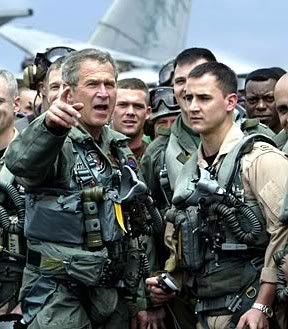PR guys and leaders do not always have the same goals, do they?
no, but part of being an effective leader is knowing your constituency…
who in their right mind thought that stumping for the sale of US property to an arab entity at this time would go over well?
the american public has very little trust in domestic big-business (enron, etc.), let alone a foriegn-run company.
if dubya had a track record of even-handed deals and business relationships, perhaps this wouldnt have caused such a shit-storm??
i’m shocked that this topic has dominated the discussion…i thought that the other stuff i mentioned at the top was much more disturbing.
[quote=“Hondu Grease”]no, but part of being an effective leader is knowing your constituency…
[/quote]
So are you arguing that Bush is a poor leader because he doesn’t follow public opinion?
It very much sounds like he’s damned if he does and damned if he doesn’t.
Alright. I said that I didn’t want to rehash an old argument, that I wasn’t going to, and that it’d all been done before. But then I ran into this guy on the street, and he very courteously asked that I come back to the subject, so here I am. Doing it now because I have the time–if only because I can’t sleep. If any of you can’t sleep reading this may well help you out. (Me and my prose. :s)
I assert that through the improper use of rhetoric, Bush & Co. are in part responsible for creating the current political climate in the US–a climate that is promoting acts not in the long-term interest of the US.
Rhetoric is of central importance to my argument because as inept as Bush is with language those surrounding him actually know what they’re doing with the words they’re (trying) to put in his mouth. They’re crafting a message that literally says one thing, but conveys another. Tigerman has consistently taken an opposing stance, often invoking the “you can’t argue with Humpty Dumpty, because for him, words have no meaning” rule. So, I guess I should begin by taking a shot at cracking that egg.

The art and science of rhetoric boils down to “form & content”:
[quote=“Silva Rhetoricae”] Because rhetoric examines so attentively the how of language, the methods and means of communication, it has sometimes been discounted as something only concerned with style or appearances, and not with the quality or content of communication. […] Rhetoric has sometimes lived down to its critics, but as set forth from antiquity, rhetoric was a comprehensive art just as much concerned with what one could say as how one might say it. Indeed, a basic premise for rhetoric is the indivisibility of means from meaning; how one says something conveys meaning as much as what one says.
For anyone really interested in rhetoric, the Forest of Rhetoric is a fantastic resource.
[/quote]
That’s a slice of the humanistic, artsy study of rhetoric. Here’s a slice of the (cognitive) scientific study:
[quote=“study I’m not going to look up now, but will if you’re really interested”]Under laboratory conditions, a number of people are told a story of a man who sits down to a meal in a fine restaurant, eats, then leaves without paying. During the course of the story, they are told how much this meal costs. Some of the participants are told that this man is a real jerk who regularly dines and dashes, sticking the restaurant–or worse, the servers–with his bill. Some of the participants are told that during the course of the meal, this man receives a call on his cell phone, and that it is because he hears that his son has just been rushed to the hospital following a serious automobile accident that he leaves without paying.
The kicker: after the story concludes the researchers ask, “What was the value of the unpaid-for meal?” Those told the negative story–this guy’s a jerk–consistently remember a bill that is–on average–something like 25% more than it actually was in the story. Those told the positive story–he’s a concerned parent–consistently remember a bill that is significantly less that it actually was.[/quote]
Now, if we were to only read the actual text of the stories told, and look at the results, we’d have to think that either both these groups suffered from faulty memories, or that they didn’t understand some of the words used. That’s not the case. Their memories work just as well as, I don’t know, 98% of us, and their language skills are fine. Presentation influences perception, which influences emotion, which distorts cognition and memory. Half the participants were primed to remember things one way, and half were primed to remember them another. In both directions, the priming worked. (Malcolm Gladwell discusses priming in Chapter 2 of “Blink”, for those who have it on the self.)
I submit that it’s fair to suppose that just reading the speeches of Bush & Co. isn’t enough to accurately gauge the message conveyed/ received. The words matter, but so do context and delivery because these prime the audience to receive the message.
A relevant–if unscientific–test of the importance of context and delivery might be provided by taking four distinct looks at Bush’s 14 Sept 2001 speech at Ground Zero.

First, the text:
[quote]THE PRESIDENT: Thank you all. I want you all to know –
Q: Can’t hear you.
THE PRESIDENT: I can’t talk any louder. (Laughter.) I want you all to know that America today – that America today is on bended knee in prayer for the people whose lives were lost here, for the workers who work here, for the families who mourn. This nation stands with the good people of New York City, and New Jersey and Connecticut, as we mourn the loss of thousands of our citizens.
Q: I can’t hear you.
THE PRESIDENT: I can hear you. (Applause.) I can hear you. The rest of the world hears you. (Applause.) And the people who knocked these buildings down will hear all of us soon. (Applause.)
CROWD: U.S.A.! U.S.A.!
THE PRESIDENT: The nation sends its love and compassion to everybody who is here. Thank you for your hard work. Thank you for making the nation proud. And may God bless America. (Applause.)
CROWD: U.S.A.! U.S.A.! (The President waves small American flag.) (Applause.)[/quote]
Second, the speech: Audio only: Sept. 14th, Ground Zero speech
Third, the scene: Video: Sept. 14th, Ground Zero speech
Fourth, memory. Ok, it’s a subjective test but, whatever, that’s kind of the point. For me, none of these media even begins to convey what I remember seeing, hearing, and feeling when I watched it live. It doesn’t have the same visceral impact, nor the same cognitive impact. It’s now difficult to understand what that meant then. Hell, I’ve seen an interview with Bush and his wife, and in reference to this crowd’s emotion W. says, “Yeah, I think that there was some blood-lust in that that day,” but that doesn’t come through in print, and it doesn’t come through much at all in retrospect.

I contend that on numerous fronts, Bush & Co.'s rhetoric was effective, if counter-productive. From declaring a “crusade”–
[quote=“The Christian Science Monitor - 19 Sept. 2001”]Europe cringes at Bush ‘crusade’ against terrorists
As Europeans wait to see how the United States is planning to retaliate for last week’s attacks on Washington and New York, there is growing anxiety here about the tone of American war rhetoric.
President Bush’s reference to a “crusade” against terrorism, which passed almost unnoticed by Americans, rang alarm bells in Europe. [color=blue](again, context & reception)[/color] It raised fears that the terrorist attacks could spark a ‘clash of civilizations’ between Christians and Muslims, sowing fresh winds of hatred and mistrust.[…]
On Sunday, Bush warned Americans that “this crusade, this war on terrorism, is going to take awhile.” He and other US officials have said that renegade Islamic fundamentalist Osama bin Laden is the most likely suspect in the attacks.[…]
Bush sought to calm American Muslims’ fears of a backlash against them on Monday by appearing at an Islamic center in Washington. There he assured Americans that “the face of terror is not the true faith of Islam. That’s not what Islam is all about.”
[color=blue](Unfortunately, how many people ever remember the p.3 retraction after the blazing headline on p. 1?)[/color][/quote]–to painting a Manichaean picture (which ultimately left the US standing virtually alone)–"

Every nation, in every region, now has a decision to make. Either you are with us, or you are with the terrorists"
–to reflexively withdrawing to the Homeland and throwing up more walls-- “Our nation has been put on notice: We are not immune from attack. We will take defensive measures against terrorism to protect Americans. […] So tonight I announce the creation of a Cabinet-level position reporting directly to me – the Office of Homeland Security.”

[color=blue](don’t tell me that’s not having an effect on the immigration debate and undermining the president’s moderate position[/color]
–to color-coded yo-yo alerts that actually produced a run on duct tape, it’s hard to believe that what’s said, and how’s it’s said, isn’t shaping the political environment in negative ways.
It’s also hard to believe that it isn’t deliberate. The Bush administration periodically put the USA on high alert for terrorist attacks even though then-Homeland Security chief Tom Ridge now says, “There were times when some people were really aggressive about raising it, and we said, ‘For that?’”
Yes, it would be unseemly to be caught using 9/11, or the War on Terror for partisan political ends. And Bush recognized that:
[quote=“Bush on spending to fight the war on terror”]US President George W Bush has announced plans for a $48bn increase in defence spending to fight the war on terror.[…]
He said that his proposals were non-partisan, stating that there were no differences between the White House and Congress on the issue.
"I have no ambition whatsoever to use this as a political issue. There is no daylight between the executive and the legislative branches," he said.
“I have a responsibility to prepare the nation for all that lies ahead,” he said.[/quote] But Bush, or someone close to him, also recognized the rhetorical power of such imagery:

Image taken from a Bush-Cheney '04 t.v. campaign ad.
While I find it hard to believe that there isn’t deliberate manipulation behind all of this…
[quote=“NYT: In Court Filings, Cheney Aide Says Bush Approved Leak”]WASHINGTON (AP) – Vice President Dick Cheney’s former top aide told prosecutors President Bush authorized the leak of sensitive intelligence information about Iraq, according to court papers filed by prosecutors in the CIA leak case.
Before his indictment, I. Lewis Libby testified to the grand jury investigating the CIA leak that Cheney told him to pass on information and that it was Bush who authorized the disclosure, the court papers say. According to the documents, the authorization led to the July 8, 2003, conversation between Libby and New York Times reporter Judith Miller.
There was no indication in the filing that either Bush or Cheney authorized Libby to disclose Valerie Plame’s CIA identity.
But the disclosure in documents filed Wednesday means that the president and the vice president put Libby in play as a secret provider of information to reporters about prewar intelligence on Iraq.
The authorization came as the Bush administration faced mounting criticism about its failure to find weapons of mass destruction in Iraq, the main reason the president and his aides had given for going to war.[/quote]
…particularly when viewers of those news organizations most closely aligned with the administration have been shown to mostly likely be misinformed about the facts concerning the war in Iraq…
[quote=“Media survey: Misperceptions, the Media and the Iraq War”]Study Finds Widespread Misperceptions on Iraq Highly Related to Support for War
October 02, 2003
A new study based on a series of seven US polls conducted from January through September of this year reveals that before and after the Iraq war, a majority of Americans have had significant misperceptions and these are highly related to support for the war in Iraq.
The polling, conducted by the Program on International Policy (PIPA) at the University of Maryland and Knowledge Networks, also reveals that the frequency of these misperceptions varies significantly according to individuals
And what ends might those be?
And don’t forget… brevitas est animus of lepor lepos.
And what ends might those be?[/quote]TMan -
Did you forget?
#1 - World Domination
#2 - Control of all Oil supplies so as to lower prices in te USA
#3 - Judeo-Christian Dominance
#4 - Bilterburg/NWO/StoneCutters/etc.
#5 - There is no #5
#6 -
#7 - Hinder the social/economic development of Canda
#8 - Greedy Halliburton
#9 - Mo money Mo money Mo money
#10 - see #1
Tman - didn’t you get the memo?
I’ll have another copy sent to you.
I hear ya, TC.
I just don’t understand why it is so difficult to believe that Bush believes that there are evil people in the world, and that he believes that his strategy in the middle east is the best way to reduce the number of such evil people.
That makes sense to me.
[quote=“Tigerman”]I hear ya, TC.
I just don’t understand why it is so difficult to believe that Bush believes that there are evil people in the world, and that he believes that his strategy in the middle east is the best way to reduce the number of such evil people.
That makes sense to me.[/quote]
And the circular argument starts again.
Evil people? yes
In Iraq? no in Afgahnistan
But Iraq helped them. No they didn’t
But they would have if they had had a chance. Is that reason to start a war?
Yes it was. No it wasn’t.
The best strategy would be to just get out of their countries and out of their business – really get out everywhere, not just talk about it – for a few years and see what happens. We might get lucky. They might decide to just mind their own business too. It couldn’t hurt to try.
Getting into their countries and getting into their business doesn’t seem to be solving anything. It just seems to be making things worse.
If you’re interested in working out what these ends were, I’d say that one of the best place to look is back, to splits within the Republican Party, and to splits between those who feel the governments should serve the people, and those who feel that the government should serve business.
Shifting the tax burden, and corporate welfare are two fiscal issues that jump to mind. A roll-back on civil liberties, and stronger role for the church in the state also come to mind. But taking care of the corporations before all else sticks out.
[quote=“McCain Interview with Detroit Free Press”]Q- Detroit Free Press: Do you feel like your party has abandoned some of its core beliefs?
A - Sen. John McCain: I think it depends on what you mean by core values. Obviously I’m very disappointed in the deficit. I’m extremely disappointed in the failure to seriously address climate change, which I think is real, and the overwhelming preponderance of scientific evidence indicates that. But I’m also in agreement on national security, national defense, Iraq, a number of other issues.
If you talk about pure principles, I think that the Republican Party is probably still adhering to those principles. But many of the practices, including this incredible wasteful pork barrel spending is just phenomenal. It’s disgraceful.
I don’t know if you noticed, but yesterday there was a report about the transportation bill, the highway bill. When Ronald Reagan complained about the 1987 highway bill, he complained about the 157 pork barrel projects that were in it. This bill has over 3,000. It’s unbelievable the way this pork barrel spending has grown.
You may know that I have had a huge fight about the leasing of Boeing aircraft. It’s really been an unsavory kind of scenario that unfolded, which resulted in resignation of the chief executive officer and the chief financial official officer, but no change in the Pentagon. Yet that process was all begun by Sen. (Ted) Stevens (R-Alaska) inserting a line in the Defense appropriations bill that said the Air Force will lease these tankers. Now, there was no hearing on the Senate Armed Services Committee. Sen. Levin, Sen. (John) Warner and I never got to have a hearing and find out what this proposal was. This system is broken.
I would like to tell you one other brief story that took place about three years ago. In order to get a loan guarantee to build a ship you have to meet certain criteria. And the Maritime Commission are the people who decide that. Sen. Ted Stevens, Sen. Dan Inouye, D-Hawaii, and Sen. Trent Lott, R-Miss., put in a provision in the appropriations bill that provided for waiver of all criteria for a loan guarantee in order to build two cruise ships at the shipyard in Pascagoula, Mississippi. These cruise ships would then have the exclusive right to sail the Hawaiian Islands. That was put in an appropriations bill. Never a hearing, never anything.
I went crazy. I said, look, we have never built a cruise ship in the United States and we will not now. We just don’t do it; we’re not capable of building cruise ships. And by the way, one of the guys who was involved in it was one of the guys from this area that ran the gambling business.
To make a long story short, about three years later, there are two hulks sitting in this shipyard in Mississippi, one of them half done, one of them barely done, and the taxpayers are out $273 million in loan guarantees. Now these two hulks have since been towed over to Europe. And the taxpayers of America are out $273 million because these guys, without a hearing, without examination – all of this stuff goes on now in a way that there is no process that the American people and other legislators, much less the American people, have an input into the process. The system is broken.
Major policy changes, major fundamental policy changes.
Sen. Stevens put in last year a provision that required certain processers in Alaska to have a monopoly on the fishing and crab harvest. The old Soviet Union tried that one. Fishing quotas are legitimate and called for because there is a scarcity of fish. Right? But what he put in was a processing quota. A certain amount of fish has to go to certain processers. And you know who was the lobbyist? His son. [/quote]
Jaboney, the only mistake in that argument is that you seem to think the republicans have a monopoly on pork barrell spending.
I doubt he thinks they have a monopoly. But they have more power now.
Something I find most partisans have trouble accepting is that power tends to corrupt those who have it; and that this leads to a tendency toward more corruption from whichever party has more power at the time.
Due to this cognitive dissonance, the partisan’s solution to government corruption tends to be “Well just put ‘my guys’ in power – they will use their power for the good of others and not themselves. They are different!”
If one does not buy into the “good guys in white hats, and bad guys in black hats” fairy tale (and it’s sad to see how many do), then alternative solution is to support policies that limit the role and power of government to those areas where it is truly necessary. Reduce taxes. Reduce spending. Reduce the power of elected officials through regulatory power to solicit bribes, overt or otherwise, from powerful groups/entities/individuals. Reduce the role played by societies most power-hungry individuals in making arbitrary rules for everyone else.
Neither party is currently doing this. So the question becomes: would the current opposition party (which has traditionally favored giving government more money and more power to make decisions “on behalf of” the less powerful), defy all prior experience of human nature and become suddenly immune to the corrupting stench of nearly unlimited money and power?
It never ceases to amaze me how many people seem to think that the answer to that last question is yes. ![]()
No, no… I’m under no illusions when it comes to pork. Nor when it comes to guys in white hats/ black hats, though some hats seem to rest more easily on some heads than others.
I do not believe there’s any kind of conspiracy here. For the most part, it’s a very open political program. I simply believe that that program is noxious to a healthy society.
[quote=“Richardm”]
And the circular argument starts again.
Evil people? yes
In Iraq? no in Afgahnistan
But Iraq helped them. No they didn’t
But they would have if they had had a chance. Is that reason to start a war?
Yes it was. No it wasn’t.[/quote]
That was never my argument. Nor was it Bush’s argument.
The argument is that the mideast needs to be changed and iraq is a good place to start that change. Once changed, there will be less reason for people from there to resort to terrorism to solve problems.
What is so circular about that?
[quote=“Jaboney”]If you’re interested in working out what these ends were, I’d say that one of the best place to look is back, to splits within the Republican Party, and to splits between those who feel the governments should serve the people, and those who feel that the government should serve business.
Shifting the tax burden, and corporate welfare are two fiscal issues that jump to mind. A roll-back on civil liberties, and stronger role for the church in the state also come to mind. But taking care of the corporations before all else sticks out. [/quote]
Sorry, but I honestly don’t see how any of that has anything to do with anything that Bush is trying to do in the ME.
The facts are that for many years the ME region has spawned unhappy people who have increasingly sought to employ terrorism as a means of bringing about change.
Many administrations, both republican and democrat, prior to the current one have wrestled with the problems of unrest in the ME and the terrorism it generates.
Then 9/11 happened.
That is why we are in the ME. That is why we are in Iraq.
Its really simple.
You can disagree with Bush’s plan. But, looking for and finding all kinds of evil and unethical motivations seem to me to be way off base.
I’m not claiming that this is related to the Middle East. These claims specifically address the current political environment in the US.
[quote=“Tigerman”][quote=“Richardm”]
And the circular argument starts again.
Evil people? yes
In Iraq? no in Afgahnistan
But Iraq helped them. No they didn’t
But they would have if they had had a chance. Is that reason to start a war?
Yes it was. No it wasn’t.[/quote]
That was never my argument. Nor was it Bush’s argument.
The argument is that the mideast needs to be changed and Iraq is a good place to start that change. Once changed, there will be less reason for people from there to resort to terrorism to solve problems.
What is so circular about that?[/quote]
In the time immediately before the invasion, Bush never said anything about “Well, we might as well start here. It’s as good a place as any to start.”
Of course he did.